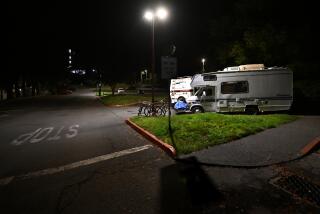Op-Ed: We’re semi-retired and living in an RV. It’s not as ghastly as it may sound
In 2017 my husband, Ralph, and I moved 23 times. It wasn’t difficult because our house has wheels.
Two years ago, we decided to buy a 28-foot motor home and hit the road full-time, but our lifestyle change really began in 2009, when we realized that we couldn’t hold on to our home in San Diego. My husband was semi-retired, and I was working in the increasingly beleaguered newspaper business.
First we moved to Washington state, where I procured a job at a paper in a tiny town in the east Cascades. We got tired of the snow and isolation and headed back to California. We found house-sitting and caretaker gigs, and I was freelancing when we decided we needed a place of our own. Buying a house, even renting an apartment in California was financially out the question. But a used motor home was within our budget.
We were both AARP members. We’d already jettisoned the stuff you build up over living for a long time in one place. We were prepped for something completely different. Our kids were all for it; our friends, not so much. More than one thought we were a little crazy. But as it turns out, living full time in an RV is not all that unusual. Now we’re sort of homeless, and we love it.
It’s better to be counting your pennies on the road than in what passes as an affordable house or apartment in almost any U.S. city.
The Recreation Vehicle Industry Assn. estimates that there are between 100,000 and 200,000 full-time or extended-stay RVers on America’s roads at any one time, but it’s tricky to calculate. Some people are pure vacationers, in and out of RV parks. Others are stationary in their motor homes. I don’t consider them RVers exactly because they are using their motor homes as shelter and nothing more.
Plenty of young families are on the move, like we are. They’re towing 1960s Airstreams or piloting brand new Winnebagos (RV sales are at record highs). But the people who are usually our fellow travelers are in their 50s, 60s or beyond: retired or something close to it, but not exactly living a leisure life.
According to Wand’erly, an RV magazine I follow on Instagram, nearly half of us who travel more or less full time live on less than $30,000 a year. We work freelance jobs or do “work camping” — picking up $7 to $12 an hour packing boxes at a nearby Amazon warehouse or making change behind the counters at national parks. Some work at the RV park for a discount on daily fees. I know RVers who time their travels to pick sugar beets during the harvest along the border of North Dakota and Minnesota.
My husband and I have a routine that’s common. We find a place we like that is affordable and stay for a few months at a time. On average, a spot at an RV park anywhere other than the West Coast costs about $500 a month. In San Diego, the prices are about $1,000 a month, still about half the rent of a small apartment. If need be, we head for the hills and camp off the grid, as “boondockers,” until some money comes in.
When the weather turns cold, most RVers pull in their awnings and drive to a park full of amenities along the Colorado River, or to Florida, to spend the winter. Thousands head to Quartzsite, Ariz., where there are inexpensive ($20 a night) and very basic campsites, or boondock at Bureau of Land Management desert sites. We park at Elks Clubs quite often, which offer basic hookups for not much money. It’s a short walk to the club bar and very safe. The point is, when you live in an RV, as long as you have money for gas, you can move on down the road.
This sounds ghastly to a lot of people, but I don’t know why. On a small budget, I can drink my morning coffee beneath the red cliffs of Utah or on the beach at Santa Barbara. I can chat with travelers from all over the world. And from one week to the next, I can be hiking in the Colorado Rockies or strolling through a redwood grove. I may not be at the apex of the career ladder, but they don’t call this semi-retirement for nothing. Besides, sitting on the couch watching my stocks dive up and down on CNN all day, or going on a cruise or two before I die, isn’t for me.
According to the U.S. Bureau of Labor Statistics, the over-65 set is expected to be the fastest-growing demographic in the workplace by 2024. So why shouldn’t our work require just a few hours each day moving boxes in a warehouse or raking leaves or cleaning a toilet or two at the RV park? I recently met an 87-year-old man who has been moving from campground to campground as a host/maintenance man — greeting guests as they check in, making minor repairs on buildings and keeping restrooms in working order — for 20 years. He was about to finish a gig at Santee Lakes in San Diego County and looking forward to the next one at the Red River Ranch Campground in New Mexico, where he planned to live and work until summer.
For some RVers, it’s a difficult life of scrimping and saving. I’ve been there a few times myself, but when you wake up surrounded by pines trees and catch sight of an eagle overhead, you realize it’s better to be counting your pennies on the road than in what passes as an affordable house or apartment in almost any U.S. city.
I still write to make money about six hours every day, and I hope to be doing it for a very long time because I love it. My husband, at 70, receives Social Security and works as a handyman for friends and family when we are in their vicinity. Otherwise he bikes and hikes and kayaks until the sun sets.
We have a small nest-egg saved for whichever one of us goes into a nursing home first, and we don’t touch it — not for new tires, engine repairs or wine. The full-time RV life isn’t always easy, and things don’t always go as planned, but living on the fly has brought us closer together and given us an opportunity to wake up to something new every day.
Candice Reed lives and writes in a 1984 motor home she shares with her husband. Her novel, “Vixens of Vanishing Island,” is available on Amazon.
Follow the Opinion section on Twitter @latimesopinion and Facebook
More to Read
A cure for the common opinion
Get thought-provoking perspectives with our weekly newsletter.
You may occasionally receive promotional content from the Los Angeles Times.






